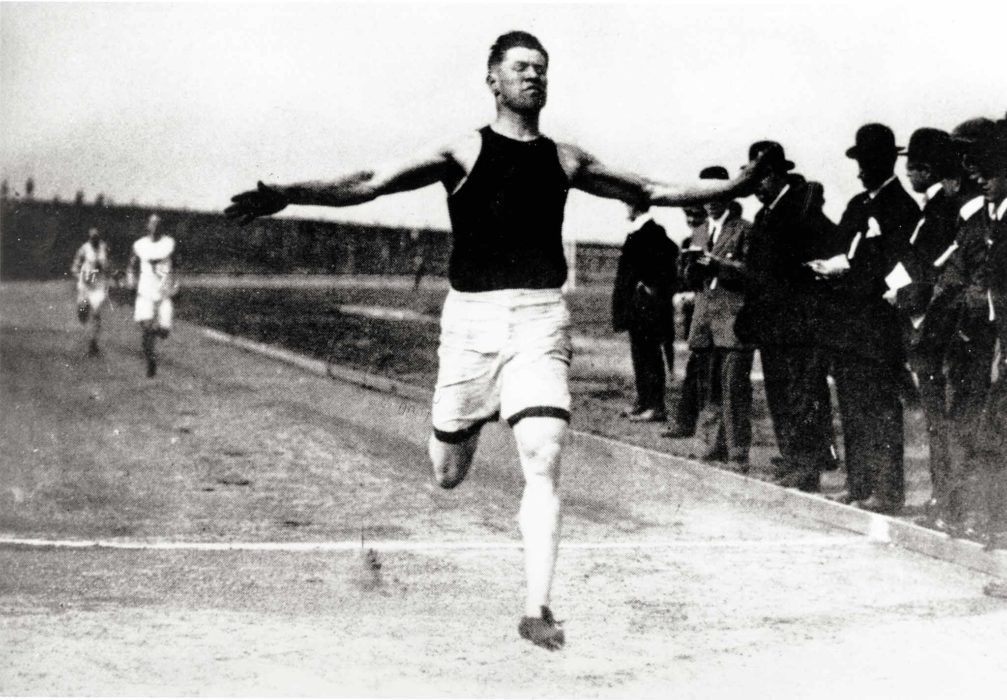“INDIAN THORPE FIRST IN Olympic Pentathlon,” the New York Times announced on May 19, 1912, reporting on one of the first rounds of the Olympic tryouts. Jim Thorpe, whose parents were both half Native American, from the Sac and Fox nation in Oklahoma, had tried out in Brooklyn for the American Olympic team, and he had blown the field away. “Physically, he is a magnificent specimen,” the New York Evening World wrote of him, “fit to be compared with the greatest of the ancient Greeks. . .” Pierre de Coubertin, the founder of the modern Games, hoped the Olympics would help realize international peace. By June 20, when ‘Abdu’l-Bahá prepared to leave New York for a few days of rest in Montclair, New Jersey, the Games were nine days away. They would begin June 29 in Stockholm, Sweden.
In a few weeks time the Reverend Percy Stickney Grant would ask ‘Abdu’l-Bahá about the Olympics. Grant believed in the building up of physical strength as a prerequisite for moral uprightness. But ‘Abdu’l-Bahá had a different point of view. “We do not deprecate physical development,” he said, “for the sound mind should work through a sound body, but We think that the people of the West are too much concerned with mere physical development. They forget the need of spiritual development.”
This morning he told those assembled at his apartment at 309 West 78th Street in Manhattan that he would soon hold a spiritual feast, a “feast of unity.” He wanted it “outdoors under the trees, in some location away from the city noise — like a Persian garden.” “[H]earts will be bound together,” he said, “spirits blended and a new foundation for unity established. All the friends will be my guests.”

Coubertin hoped universal peace might emerge from a new generation of unprejudiced youth. The Games he envisioned were a form of peace education to bring young people together for “amicable trials of muscular strength and agility.” But in 1912, during the age of colonialism, only twenty-eight nations actually competed. Japan became the first Asian nation to join, and Egypt the first Arab and African nation.
After the first modern Olympic games took place in 1896, Coubertin reflected that “One may be filled with a desire to see the colors of one’s club or college triumph in a national meeting, but how much stronger is the feeling when the colours of one’s own country are at stake!” But the Olympics were more symbol than substance when it came to the peace movement.
Two years after celebrating international reciprocity in Stockholm, German regiments were marching across the Rhineland, machine guns were tearing flesh apart on the Marne, British dreadnoughts were barricading the continent, and even Sweden, a country that declared itself as neutral, was planning to lay mines along its main shipping lane, the Kogrundsrännan, to keep Allied ships out of the Baltic Sea.
“The great mass of humanity does not exercise real love and fellowship,” ‘Abdu’l-Bahá told his audience on June 20. He believed that if humanity were to unite, people needed a universal cause that extended beyond national loyalties. It wasn’t enough for people to merely tolerate each other. He wanted people to “be as the parts and members of one body.” The organs of the human body are diverse in shape, composition and function, he explained, but the result of their harmony is a healthy human being, much more than the sum of its parts.
Such a degree of unity, ‘Abdu’l-Bahá said, had existed among Bahá’u’lláh’s early Persian followers: “There was no duality but complete mutuality of interests and love.” “If in need of a hat or cloak,” he said, “they would take and use it. The owner would be thankful and grateful that the garment had gone.” ‘Abdu’l-Bahá hoped his unity feast would enable each participant to become “a cause of unity and center of accord,” and that it would generate “this same degree and intensity of love.”






